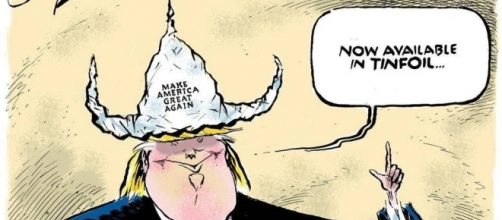Last Monday was reportedly the deadline given to the White House by both the House and Senate Intelligence Committees, according to Congressional aides, for them to prove that their claims that former President Obama had wiretapped Trump Tower, a claim made by President Trump during a rally at the beginning of March.
As Monday came and went, the White House did, in fact, respond to requests for evidence, via the ripple effect of statements made by Senior Counselor Kellyanne Conway that Sunday, saying that many things could be turned into surveillance equipment, especially microwaves, which appeared to many to be a foreshadowing of statements from the White House.
On the date of the deadline, Press Secretary Sean Spicer would then say that "wiretapping" didn't actually mean wiretapping.
Scrambling for lack of evidence
Blasting News reported on Spicer's response, as well as that of the Department of Justice (DOJ) -- which asked for more time on Monday to bring evidence -- and on members of the House Intelligence Committee who mildly dispute that they gave a deadline at all. On Wednesday, House Intelligence Committee Chairman Devin Nunes said that they do not believe there is any evidence that wiretapping took place. On Wednesday morning, Attorney General Jeff Sessions said "no" when asked if he ever gave President Trump any reason to believe he had been wiretapped.
Later that evening, President Trump went on Fox News with Tucker Carlson where he repeated the same thing that his Press Secretary said on Tuesday, that, what he meant by "wiretapping" was broad surveillance, which many felt at this point was the president walking back his statements. But just as before, administrative officials had already determined that there was no proof that President Obama had wiretapped Donald Trump. Many felt that when Sen. Lindsey Graham said he was ready to subpoena the executive branch to investigate whether the wiretapping was true, that he was calling President Trump's bluff. Letters were sent to the acting deputy attorney general and FBI director James Comey, to say whether this was true.
Manipulations and distractions
Top House Intel committee Dem: Trump wiretapping allegations "patently false" https://t.co/Gdc9dpjPt7 pic.twitter.com/k2aQZp3X0T
— The Hill (@thehill) March 19, 2017
The reports on the wiretapping conspiracy are naturally divisive among the President's supporters and his opposition. Within the accusations are references to Russia's interference in the 2016 presidential election, which the FBI is apparently still investigating. A Washington Post article titled, "Sean Spicer just explained why 'wiretapping" is different from wiretapping," the Press Secretary referred to reports from various media outlets -- even those despised by and at one point even disciplined by the administration -- that had talked about other aspects of surveillance that occurred.
Blasting News recently reported on the possibility that a Fox News commentator influenced the Trump White House to fire DOJ prosecutors. The article mentions news of Wikileaks releasing CIA documents that talk about CIA hacking tools.
The same commentator seemed to be benefitting from a developing conspiracy that the Russians did not hack the DNC last year but rather, that it was the CIA who made it seem as if they had. While Spicer was not referring to this conspiracy directly, it directs focus to what is a similar trend with Fox News where they believe that some people on the Trump team were wiretapped. The trend is in reference to Trump's former National Security Advisor Michael Flynn who resigned over calls he made to Russian officials, who Fox News' Steve Doocy said that the reason his conversation with the Russian ambassador was known was because he had been wiretapped.
In fact, the Post originally reported that it was the Russian ambassador was wiretapped. It would appear that Doocy and Hannity's (among others) influence help contribute to Trump's wiretapping conspiracy, which Spicer is more than happy to debate with reporters.

